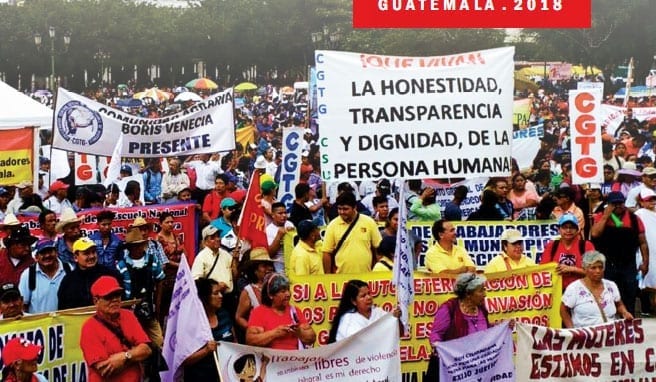
Aug 7, 2019
At least five union activists were murdered in Guatemala in 2018, and union leaders and members in Guatemala and Honduras suffered dozens of incidents over the past year for standing up for worker rights, including restriction of union rights, intimidation, harassment, illegal detention, death threats and attempted murder, according to two new reports.
In Guatemala, union leaders and members reported 882 crimes to the Office of Crimes Against Trade Unionists, including coercion, kidnapping and murder. Yet there were only two convictions, according to the Annual Report on Anti-Union Violence in Guatemala. Incidents against union activists in Honduras were concentrated in the department of Cortés in northern Honduras, which includes the major industrial city of San Pedro Sula, as well as a key agricultural area where banana and palm plantation workers are struggling to win decent wages and working conditions.
Both reports recommend that unions prioritize registering incidents of violence against union activists, incorporate gender analyses to prevent and demand protection from gender-based violence and harassment at work, and urge the governments to work across agencies and departments to prevent union violence, protect victims and end impunity.
Honduran Agricultural Workers Targeted in 2018
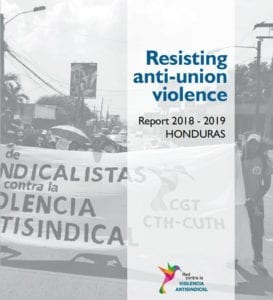 Union leaders in the area from the agro-industrial union STAS, the banana union SITRATERCO and other unions represented 26 of the 38 total victims of anti-union violence between February 2018 and February 2019, according to the report, Resisting Anti-Union Violence in Honduras. Women who were targeted often received threats against their mothers and children, the report finds.
Union leaders in the area from the agro-industrial union STAS, the banana union SITRATERCO and other unions represented 26 of the 38 total victims of anti-union violence between February 2018 and February 2019, according to the report, Resisting Anti-Union Violence in Honduras. Women who were targeted often received threats against their mothers and children, the report finds.
The number of incidents of anti-union violence has steadily increased since the network’s first report, from 14 in 2015 to 39 in 2017, with one less incident in 2018. Union anti-violence networks in Honduras and Guatemala, supported by the Solidarity Center, annually issue reports documenting violence and intimidation against worker rights activists.
Agricultural worker activists represented 86 percent of the victims of anti-union violence in Honduras, a startling shift from past years, when state and public-sector violence against union leaders and activists represented a majority of incidents, according to data in previous reports. The remaining incidents in 2018 were directed at public employees.
“Stopping the systematic aggressions like those faced by STAS, SITRASEMCA, SITRATERCO and SITRAINFOP is an urgent responsibility for the state of Honduras,” according to the report.
The International Labor Organization (ILO) held back-to-back hearings at the International Labor Conferences (ILC) in 2018 and 2019 on Honduras’s failure to abide by its international commitments. The ILC report in 2018, which expressed “deep concern at the large number of anti-union crimes, including many murders and death threats, committed since 2010,” urged the Honduran government to protect vulnerable unionists, investigate more than a decade of unsolved murders of union leaders and prosecute those responsible for the crimes.
Among union activists murdered in Guatemala, Domingo Nach Hernández, a member of the Workers’ Union of the Municipality of Villa Canales, was found dead in June 2018, days after being kidnapped. Soon before he disappeared, the union had won back the jobs of several workers who were illegally fired. Hernández had previously received death threats and reported them to authorities, according to the Guatemala report.
Freedom to Form Unions Under Attack
In 2014, Guatemala overtook Colombia as the deadliest country in the world for trade unionists. Since then, the International Trade Union Confederation (ITUC) has consistently named Guatemala one of the 10 worst countries in the world to be a worker, in its annual Global Rights Index, with a rating of 5—“No guarantee of rights”—on its 5-point scale. Honduras is similarly ranked. Countries with a 5 rating are the worst countries in the world in which to be a worker. While they may have legislation that spells out certain worker rights, workers effectively have no access to these rights and are exposed to autocratic regimes and unfair labor practices, according to the ITUC.
Violence is widespread in both countries, but attacks on worker rights activists specifically seek to weaken or eradicate the unions and their work to build citizenship, both reports note. Few perpetrators are brought to justice in either country, with only two convictions in 2018 for crimes against unionists in Guatemala, for example.
When workers seek to join unions and bargain collectively, violence is among the many obstacles they face, as employers harass and intimidate workers generally without repercussion, despite both countries’ stated support for worker rights.
“Freedom of association in Guatemala continues to be very limited, despite current legislation on human and trade union rights and the ratification of international agreements,” the Guatemala report states, noting that many worker rights activists who receive threats fear reporting it to the network for fear of reprisals.
Few Jobs, Low Wages Result in Endemic Poverty
With few jobs available in Guatemala and Honduras, workers in both countries are struggling to survive in the face of endemic poverty. According to the Honduran union anti-violence network, more than 2 million Hondurans live in conditions of “relative poverty,” while nearly 4 million live in “extreme poverty”—in a country with 9 million people. Some 80 percent of those who work are paid less than the minimum wage, the report says.
More than 70 percent of Guatemalans with jobs labor in the informal economy, with low wages, lack of job security and often dangerous working conditions. Nearly half of children younger than 5 suffer from chronic malnutrition, and almost 20 percent of the population cannot read nor write, according to the Guatemalan union anti-violence network, limiting opportunities for better-paying jobs.
The United States brought trade complaints against the governments of Guatemala and Honduras for failing to enforce their own labor laws under the CAFTA-DR trade agreement. The Guatemala case lasted eight years and, despite overwhelming evidence of systemic labor rights violations, an arbitration panel cited a lack of evidence that worker rights violations impacted trade. The Honduras complaint is still active, and the U.S. government is working with the Honduran government, employers and the labor movement on a worker rights monitoring and action plan.

Feb 4, 2019
Two union leaders in Guatemala were imprisoned January 17–28 for negotiating and signing a collective agreement between the union and the Ministry of Health authorities in 2013. Following a hearing, both union leaders were released on parole but placed under house arrest, pending a final decision.

Union leaders say the arrest of SNTSG activists Luis Alpirez Guzmán and Dora Regina Ruano is part of a sustained attack against unions in Guatemala. Credit: PSI
Luis Alpirez Guzmán, general secretary of the National Union of Health Workers of Guatemala (SNTSG), and Dora Regina Ruano, former SNTSG deputy general secretary, were charged with fraud in signing the collective bargaining agreement between the government and the SNTSG.
The arrest of SNTSG leaders highlights “a sustained attack on collective bargaining, freedom of association and the right to organize,” the Trade Union Confederation of the Americas (TUCA) says in a statement. TUCA is a regional body of the International Trade Union Confederation (ITUC).
The international labor community—including the ITUC, TUCA, Public Services International (PSI), Global Nurses United and the Caribbean Confederation of State Workers—is calling on the Guatemala government to drop all charges against the two union leaders and end the repression and harassment of trade unionists, including the prosecution of workers’ gains through collective bargaining. Although the pact was signed in 2013, it has since been suspended, leaving the workers without a contract.
(You can urge the Guatemala government to ensure justice by taking part in an online campaign spearheaded by PSI.)
Guatemala One of 10 Worst Countries for Workers
The number of trade unionists murdered in Guatemala rose to 90 in 2018 since 2004, according to the ITUC, which in 2018 ranked the country as among the 10 worst for workers. The ITUC says Guatemala’s “pervasive climate of repression, physical violence and intimidation” is “compounded by the government’s failure to provide timely and adequate protection to trade unionists who received death threats and to pursue the many historic cases of murders of trade unionists.”
The AFL-CIO and Guatemala and Honduran trade unions in 2008 first submitted to the U.S. Trade Representative a complaint regarding anti-union violence in Central American Free Trade Agreement (CAFTA). The complaint was heard by an arbitration panel in 2015 following Guatemala’s failure to implement an 18-point enforcement plan to address worker rights violations that was agreed to in 2013.
In June 2017, a U.S.-Guatemala CAFTA arbitral panel released its long-delayed decision and ruled against the workers, after the panel hearing the case decided worker rights violations documented in the complaint were not affecting trade. Within three months of the decision, five unionists were shot, two fatally.
The International Labor Organization (ILO) last year closed its six-year investigation of violence against Guatemalan union activists and other freedom of association violations, and called on the government to implement reforms, such as pursuing legislation that adheres to ILO conventions covering freedom of association and the right to form unions, and the right to organize and collectively bargain. Yet workers say with the formal closure of the ILO complaint, it is doubtful
Noting the arrests followed the ILO suspension of its investigation in November, TUCA says the government’s action “seems to indicate a trend toward greater rights violations and an increase in anti-union violence.”
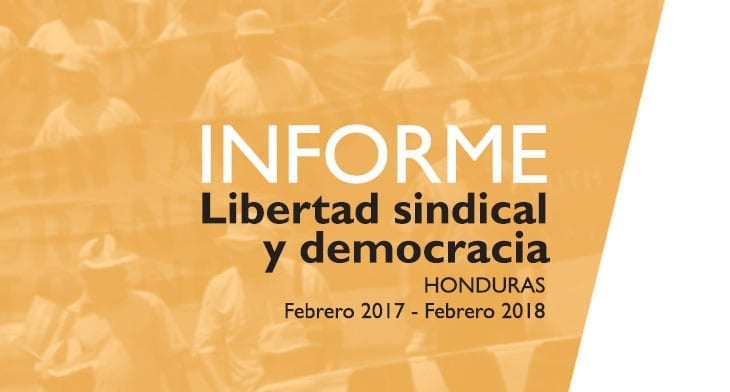
Mar 23, 2018
Two union activists were murdered in Guatemala and one in Honduras, while dozens of others were targets of violence—including threats of murder, kidnapping and stalking—over the past year, according to two reports released this week.
In Guatemala, “where the unionization rate is less than 1 percent, intolerance and violence against workers highlights, precisely, the mechanisms of terror to limit and, in many cases, to ignore those rights on the part of employers,” according to the Annual Report on Anti-Union Violence. The report, by the Network of Labor Rights Defenders of Guatemala (REDLG), found two more instances of violence in this reporting year (February 2017–February 2018) than in the previous period.
Since 2004, 87 union leaders and activists have been killed in Guatemala, one of the most dangerous nations in the world for union rights activists.
In Honduras, many of those targeted in the 39 documented instances of violence were organizing unions or seeking collective bargaining agreements in the agro-industrial palm oil sector in Colón, according to the report, “Freedom of Association and Democracy” by the Anti-Union Violence Network. Both networks are Solidarity Center partners. (The report is available in English, including an Executive Summary, and Spanish.)
Honduran Union Activist Targeted after Report Released
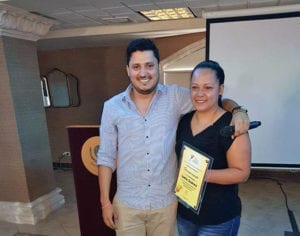
Isela Juárez is among Honduran union activists targeted with death threats. Credit: Anti-Union Violence Network of Honduras
Two days after the report on Honduras was released this week, union leader Isela Juárez, who has received death threats for her worker rights activism, was followed in a high-speed chase by two men on motorcycles before she took refuge inside the San Pedro Sula City Hall. Juárez, president of the Union of Workers of Municipal, Common and Related Services, (SITRASEMCA), also had been honored for her defense of human rights over the weekend.
The report on Honduras finds that 51 percent of the alleged perpetrators are public officials, including the military police, along with municipal authorities who harassed, coerced and fired nine workers to prevent them from forming unions.
Some 100 unionists and other members of civil society took part in the report’s launch, and several people violently targeted for their activism described their experiences. Since the network in Honduras began documenting cases of anti-union violence in 2015, 69 union activists have been targeted with violence, including seven who were murdered.
The report on Honduras also highlights a correlation between increased violence and the growing role of women in union leadership, and documents cases of unionists attacked during the post-election violence as they sought democracy.
In both countries, poverty and extreme poverty is high, with the World Bank estimating that in 2016, 65 of every 100 Hondurans lived in poverty, and 43 of every 100 in extreme poverty. In Guatemala, despite a growing economy, poverty rose to 59.3 percent in 2014.
The U.S. government has declined to consider anti-union violence in Central American Free Trade Agreement (CAFTA) complaints filed by the AFL-CIO and Guatemala and Honduran trade unions.
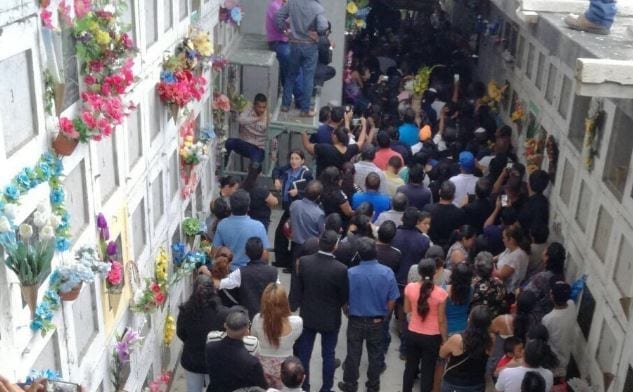
Dec 21, 2017
As part of our year in review series, we are highlighting the 12 most popular Solidarity Center web stories of 2017. This story received the most reach on our Facebook page in September. Read the full story here.
Gunmen on a motorcycle assassinated another Guatemalan union leader on Friday, bringing to 87 the number of labor leaders murdered in the country since November 2004.
Tomás Francisco Ochoa Salazar, disputes secretary for the Bremen Union (SITRABREMEN), was leaving the meat-processing plant where he worked in Guatemala City when he was shot. Andy Noel Godinez, also a union member, suffered non-life-threatening injuries in the incident. Ochoa Salazar leaves behind a wife and three children.

Sep 7, 2017
Gunmen on a motorcycle assassinated another Guatemalan union leader on Friday, bringing to 87 the number of labor leaders murdered in the country since November 2004.
Tomás Francisco Ochoa Salazar, disputes secretary for the Bremen Union (SITRABREMEN), was leaving the meat-processing plant where he worked in Guatemala City when he was shot. Andy Noel Godinez, also a union member, suffered non-life-threatening injuries in the incident. Ochoa Salazar leaves behind a wife and three children.
SITRABREMEN is a young union. It filed for official recognition in July 2016, finally receiving notice of its acceptance by the Labor Ministry in February of this year. What followed, according to the union, was a campaign of retaliation, suspensions and harassment of union leaders and members. Its secretary general abruptly resigned in August shortly before the union submitted its collective bargaining proposal to the Labor Inspectorate.
Guatemala is one of the most dangerous places in the world for worker rights activists. While the country, as a member of the International Labor Organization, is obligated to uphold and respect freedom of association, union activists are often illegally fired, threatened, attacked and murdered, and the perpetrators of the crimes go unpunished. The government denies the murders of union members and leaders are connected to their worker rights activism.
“Union repression in Guatemala is intense, and fledgling unions are often harassed out of existence,” said Joell Molina, Solidarity Center Americas director. “The result is that workers suffer—from unsafe job sites to wage theft, from harassment to physical threats if they complain.”
In April 2008, the U.S. government pursued a complaint against Guatemala for violating the labor chapter of the U.S.-Central American Free Trade Agreement (CAFTA). The government acted after six Guatemalan unions and the AFL-CIO submitted a complaint with the U.S. Office of Trade and Labor Affairs. The labor dispute was settled in June 2017, against the workers, after the panel hearing the case decided the documented violations of worker rights were not affecting trade.
Also in June, retired farmworker Eugenio López, 72, was killed when gunmen fired on a peaceful gathering of mostly senior citizens who have been unable to receive health and pension benefits from the Guatemalan Social Security Institute (IGSS) because their employer, San Gregorio, had failed to pay into the system despite deducting from their wages for years.

 Union leaders in the area from the agro-industrial union STAS, the banana union SITRATERCO and other unions represented 26 of the 38 total victims of anti-union violence between February 2018 and February 2019, according to the report, Resisting Anti-Union Violence in Honduras. Women who were targeted often received threats against their mothers and children, the report finds.
Union leaders in the area from the agro-industrial union STAS, the banana union SITRATERCO and other unions represented 26 of the 38 total victims of anti-union violence between February 2018 and February 2019, according to the report, Resisting Anti-Union Violence in Honduras. Women who were targeted often received threats against their mothers and children, the report finds.




